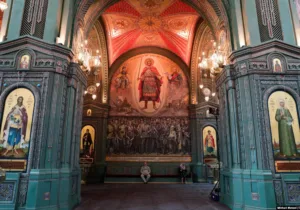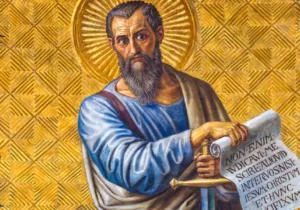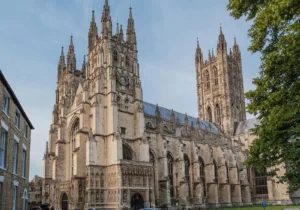Mark Tooley: Hello, this is Mark Tooley, editor of Providence, a Journal of Christianity and American Foreign Policy, with the pleasure today of interviewing, and I’ll pronounce his name very carefully, Matthew Kaemingk, professor of ethics at Fuller Seminary in California, and with a new title of Richard Mouw Chair. He’ll have to fill in the rest of the new title, but we’re going to discuss his new book on Reformed political theology which Matthew has edited, and so I’ll discuss with him. There is a vast deficiency in knowledge of historic Christian political theology in America today, especially amid the collapsing awareness and loyalties to specific traditions and denominations, and so this book is much needed and hopefully will be widely read. So, Matthew, thank you for joining this conversation, and please… Well, first of all, fill out the rest of your new title at Fuller Seminary.
Matthew Kaemingk: Sure, it’s… So, my mentor Richard Mouw had a Chair named after him and I am now in that Chair, so it is the Mouw Chair of Faith and Public Life at Fuller Seminary. And, so, I’m now running the Mouw Institute on Faith and Public Life, and we are, you know, an academic institution focused on public theology. So, public theology as a discipline includes political theology, but it covers more aspects than just that, so this particular book on public theology has a whole section focused on political theology, but it also explores other aspects of public life, like the arts and culture and the academy and things like that, but, yeah, the Reformed tradition of political theology is a rich one, and it is one that’s… that has fascinated me for many years. So,anyways, thank you so much for having me. Happy to chat.
Tooley: Well, thank you and I think you just explained to me effectively the distinction between public theology and political theology.
Kaemingk: Yeah.
Tooley: And so this book is about, more widely about, public theology, and we could even say “Mouw-ist” public theology.
Kaemingk: That’s right.
Tooley: This will be the new term among Evangelicals, perhaps. But, in essence, how do Reformed—how do Calvinists look at public theology? What distinctions do they bring to the conversation?
Kaemingk: Yeah, well, I open the book in exploring this, and really, I think when it comes to a Calvinist approach to public life… Of course, there are many different sorts of Calvinists. We behave in all sorts of ways. But, in general, there are a number of key elements. The first would be an emphasis on listening to the laity, so the priesthood of all believers, that it’s not just theologians and pastors who decide, you know, what is the will of God in the world, but, you know, Christians in political science and in literature and in politics and philosophy—they all have something to offer to the conversation. So, theology is not sort of the queen of the sciences that tells everyone else what to do and think. Another really important thing in Reformed public theology is a discussion of power, that power is not a bad thing, that it’s a gift from God. However, because of sin, it becomes misdirected in all sorts of ways throughout society, and so Christians are called to engage with power and try to be a redemptive force within systems of power, whether that be political power or artistic, cultural power or academic power. We’re called to engage those systems of power, not run away from them, and not try to dominate them, but really try to better, to redeem them. There’s, of course, many other sort of distinctions and there’s, of course, a lot in common with say Lutherans and Methodists and Baptists. But, in general, this particular book is exploring the Reformed contribution to Protestant public theology.
Tooley: Is it fair to say that Calvinists, among the various Protestant traditions, probably have a more acute or even astute understanding of the moral importance of power, even a… more of a comfort with the idea of power versus say the Baptists or others?
Kaemingk: Yeah, I think that’s right. I think we’ve—you know, as a theological tradition, we’ve spent more time reflecting on what it means to hold and own power and privilege. I think, you know, a lot of the theology that, you know, comes from Switzerland, the Netherlands, Scotland, New England, you know places where Calvinists have held power, and so they’ve been reflecting on how do you hold power responsibly as opposed to being on the underside of power and domination. So, in general, I look to Catholic and Calvinist voices as sort of the most developed when it comes to reflecting on, managing issues of power, whereas, say, liberation theologians and some Baptist and Pentecostal theologians will talk more about what does it look like to live faithfully under power, sometimes power that’s quite unjust, and so there’s quite a lot more reflection in those communities on what it means—same with Anabaptist and Mennonite reflections—on what does it look like to live under power. But if you’re looking for guidance on how to wield power, well, I think that the, yeah, the Catholics and the Calvinists have done quite a lot of that.
Tooley: And what are the specific deficiencies today among especially American Evangelicals, or American Christians more widely, in the arena of public theology that this book provides resources in terms of guidance and direction?
Kaemingk: Well, I think that for American Evangelicals, and this has been my lifelong struggle, while I call myself and count myself as an Evangelical, I find that Evangelicals largely lack a political theology. They have some issues that they care about, and they will follow a political leader based upon those issues, but they don’t really have a biblical understanding of what the state should do. What is the state responsible for, and what does a biblical understanding of justice look like? Evangelicals don’t really have that; they just have specific issues that outrage them. And, you know, some of them I really agree with, but they don’t really have this overarching…And because they lack that overarching political theology, they tend to follow the secular voices of the Right or the Left. And so many, you know, Evangelical voices that you’ll find on Twitter really do kind of parrot the political grammar of the Right or the Left, rather than articulating a Christian alternative voice, you know. It’s essentially, you buy into the ideology of the Right or the Left, and then you sort of drip Scripture on top of it, and so what I think that the contribution of this particular book on Reformed public theology is offering a third way, like a genuine alternative way of engaging in the public square that really draws from Scripture and theology rather than from sort of the thin rhetoric of the Right and the Left. And that’s what’s interesting to me. You know, I teach Christian ethics and political ethics at Fuller Seminary, and we’re a very, you know, diverse seminary politically. I have conservative students and liberal students, and the students often get confused about who I am, right, because I’m challenging the liberal students one day, and then the next day I’m challenging the conservative students, and it’s not because I’m a moderate at all, but it’s that the Reformed tradition has given me an alternative understanding of how we engage in political life. So, yeah, there’s so much more to say about Evangelical politics, but I suppose that’s where I’ll start.
Tooley: Well, I like to recall that the original generation of the Religious Right at least had Francis Schaeffer as kind of a theorist or an architect to whom they looked, and if you were in my generation as a young man, you read Schaeffer and C. S. Lewis. Young people still read C. S. Lewis, but no one under the age of 45 knows who Francis Schaeffer is, so there is really no guiding guru or theorist now for much of at least conservative Evangelical political action.
Kaemingk: Yeah, I think that’s right. I think that’s right. And who knows, you know, in the wake of Trump, what new visions will come forward and what sort of this younger generation will develop in terms of political theologies and what they’ll be drawn.
Tooley: Now, there’s clearly a lot of… There are many apocalyptic attitudes and a lot of doom and gloom typically among American Christians today, not a lot of optimism or even hope, perhaps, except in an eschatological sense. It seems to me that the Calvinist tradition brings a sensibility that largely avoids the apocalyptic attitude, accepts that, yes, we are in a fallen world, but God is here with us and there’s always opportunity. Is that a correct perception?
Kaemingk: Yeah, you know, my friend Shadi Hamid, a Muslim political theorist, he has taken a real interest in Calvinist politics, specifically around Calvinist doctrine of sin. He finds the doctrine of sin to be extremely helpful in thinking about politics, and so as you think about, you know, this apocalyptic tendency that we see in political life, you know, just sort of the extremism and the cynicism and the bitterness and the apathy and the sort of swinging from like a utopian vision that you get from Obama and then cynicism afterwards with Trump, Calvinism avoids both of those swings, right, of a bob—optimism and cynicism with its doctrine of sin. And so, that sort of strong understanding of depravity that you’re going to find throughout politics means that you are not… you’re not going to expect a romantic utopia through political life because you understand the fallenness of human beings and institutions and governments. But you’re also just not going to be surprised by that brokenness, and so you won’t become bitter and cynical because, of course, this is how political life is. You know, you don’t expect people to behave beautifully, so, you know, when Cuomo has to resign, you’re not… your whole world isn’t shattered. You say, well, of course, this is to be expected. Public officials are human beings;they’re not gods. And so, yeah, I think that a lot more needs to be done in political theology around the doctrine of sin. And my students always hate it when I say we need to talk about sin,right, nobody wants to talk about sin, but it’s extremely helpful in political ethics, and it can save them from a lot of heartbreak and a lot of bitterness, you know.
Tooley: So, we here at Providence like to self-identify as Christian Realists. I suppose Reinhold Niebuhr came from a sort of a Reformed background. Are Reformed by definition Christian realists or is that a category distinct unto itself?
Kaemingk: Oh, that’s a good question. That’s a good question. You know, my friend, Robert Joustra would be a good one to bring on about that. You know, maybe we need to bring Rob in for a good discussion about realism and political theology. Yeah, I think absolutely that a healthy doctrine of sin does make the sort of categories of realism… It really does highlight their importance, and just a clear understanding that political institutions can only accomplish so much. They have a very important calling within human life, but you’re not to expect, you know, these institutions like the UN or, you know, international law to reform or fix something like Afghanistan, for example. You have to understand that there’re limited capabilities for states, so, yeah, I think that Niebuhr and realism fit very well there. I think there’s, as I said, I just think there’s a lot more work to be done when it comes to political theology, and sin and realism would have to be a part of that.
Tooley: And in terms of institutions, obviously, a great deal of impatience and cynicism about institutions currently, but Calvinists, by definition, believe in building multi-generational institutions, correct?
Kaemingk: Yeah, I mean, really, my students just studied Althusius, tremendous, you know, 17th century political theologian who really, I think, is one of the first theologians of institutions, and I think what you see in people like Calvin, Althusius, and Kuyper is an understanding that institutions like hospitals, universities, laws, town councils—these are actually gifts from God that are to be stewarded for the flourishing of all, and when you invest in institutions, when you support and encourage them, you are really loving your neighbor in an important way, and in complex modern societies where we can’t sort of individually feed people, you need to build institutions to, you know, care for sick people, and to offer, you know, opportunities for work, and to create art, and to build systems of learning, and so I think that is, you know, an important contribution from the Reformed tradition, is that you see, and specifically in Althusius, a theological case for institutions and what he calls symbiosis that happens within a family and a guild and a village.That a sort of symbiosis can happen with an institution—within an institution like a family or a business where sort of gifts and callings are pulled out and honored and, yeah, that’s just another thing that we need more work on, is institutions, especially after we’ve gone through a season where institutions are being smashed all around us, and sometimes for good reason, right, when they become decrepit and, you know, fallen and broken in all kinds of evil ways. It is good and right to critique institutions, but if we don’t have a theology that can build them up, we’re going to be in real trouble.
Tooley: Matthew Kaemingk, editor of Reformed Public Theology, thank you very much for an enlightening conversation, and we look forward to hearing more from you.
Kaemingk: Thank you so much, Mark. Really appreciate it. Let’s do it again.






